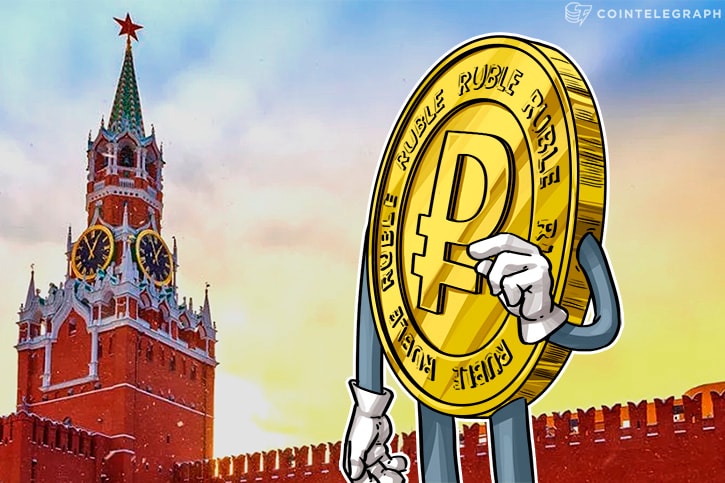The Russian Association of Cryptocurrency and Blockchain (RACIB) has announced that the government’s long-discussed idea for a state-issued cryptocurrency, referred to as the CryptoRuble, will be launched in the middle of 2019.
The Russian government has been going back and forth on launching the CryptoRuble (known earlier as the Bitruble) since 2015. As recently as late December, 2017 during a meeting on legislation for digital currencies, the Deputy Minister of Finance and the first Deputy Governor of Russia's Central Bank both stated that they did not think it was necessary for the state to issue its own cryptocurrency.
According to Arseniy Sheltsin, the head of RACIB, details of the CryptoRuble project will be officially presented and discussed in July 2018, and the coin itself should be issued a year later. The Government and the Central Bank of Russia are also expected to prepare regulatory measures for Initial Cryptocurrency Offerings (ICOs) and cryptocurrency mining by July 2018.
Early in 2018, one of President Putin’s counselors noted that the CryptoRuble could help the Russian government strengthen the economy by avoiding the impact of international sanctions against the country.
According to Russian crypto journal Forklog, the coin is set to be pegged to the ruble, non-mineable, and will be the only legal cryptocurrency in the country. The government hopes the CryptoRuble will attract foreign cryptocurrency investments.
Overall, the highest leaders in the Russian government have held mixed to negative opinions towards cryptocurrencies. At a state press conference on January 12, Putin stated:
“It is known that there is nothing behind the cryptocurrency, and it cannot be a store of value, it doesn’t have any material value, and it’s not backed by anything...”
Russia’s Prime Minister, Dmitry Medvedev, also recently criticized cryptocurrencies at the Gaidar’s Forum in Moscow. He compared the virtual currency trend with the dotcom bubble and suggested that most cryptocurrencies are likely to cease to exist, while Blockchain technology will remain, declaring:
“We can not completely exclude the scenario that took place at the beginning of the 90s when many companies arose on the basis of the developing Internet technology and in the beginning of the 2000s those companies mostly disappeared from the scene. Nonetheless, the technology itself not only survived but currently plays an important role in our life. In a likely manner cryptocurrencies may disappear in several years, but the technology which stands behind them, I mean blockchain, will become a part of our everyday reality. This scenario cannot be denied,”
In response to the Russian government’s recent critique of cryptocurrencies the CEO and Chairman of the Executive Board of the largest Russian bank Sberbank Herman Gref called on the authorities to not ban virtual currencies. Gref considers both cryptocurrencies and Blockchain to be the “new huge technologies whose power cannot be realized at the moment.” He also declared “in no circumstances should [cryptocurrency] be banned”.
Several other countries have also announced plans to introduce their own state-issued cryptocurrencies, such as Venezuela and Senegal.


